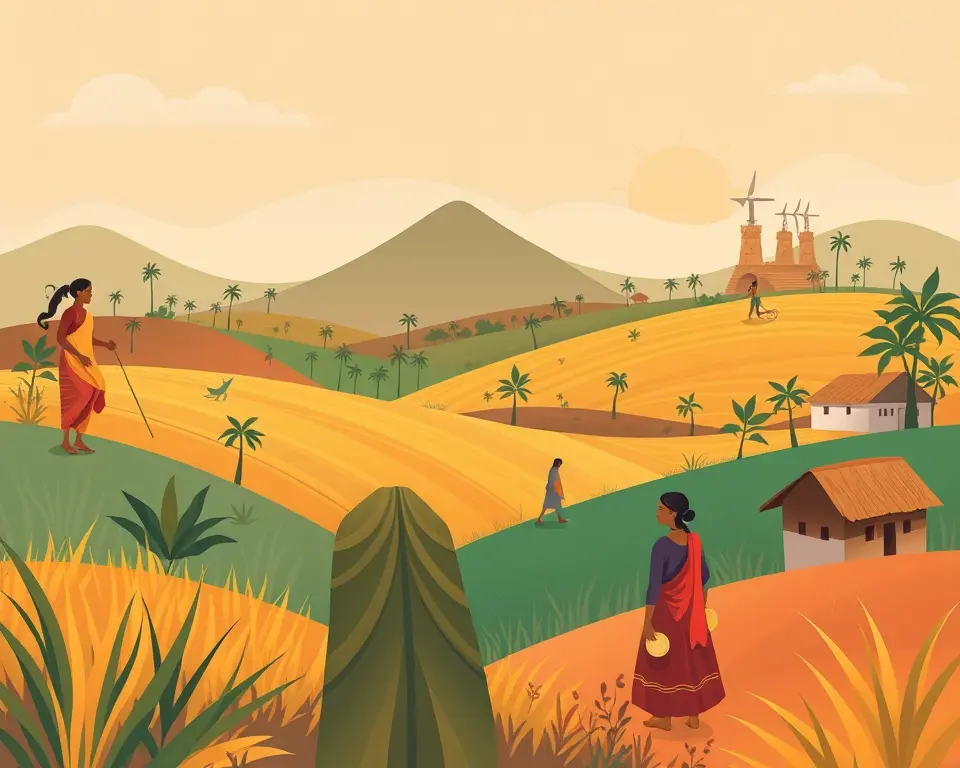Finance Minister Nirmala Sitharaman’s announcement of the Grameen Credit Score (GCS) in the Budget 2025 has sparked considerable excitement. This initiative aims to transform how Self-Help Groups (SHGs) and individuals in rural India access credit, promising to unlock new opportunities for economic empowerment. The framework is primarily focused on serving the credit needs of SHG members and people in rural areas. Public sector banks will spearhead the development of this credit score framework.
Understanding the Grameen Credit Score
The Grameen Credit Score is a new system designed to assess the creditworthiness of individuals within Self-Help Groups (SHGs), primarily in rural areas. It seeks to address the existing challenges faced by these individuals in accessing formal credit due to a lack of traditional credit history.
Addressing the Financial Inclusion Gap
Millions of women involved in SHGs across India’s rural areas are not directly linked with the formal credit systems, making financial inclusion difficult. The Grameen Credit Score aims to formalize SHG transactions within the central credit system of India, allowing financial institutions to better assess creditworthiness.
How It Works
Instead of relying solely on individual credit histories, the Grameen Credit Score will consider the repayment performance of the entire SHG. This means that even individuals with limited or no prior credit history can benefit from the group’s positive track record. Banks can now use the credit score of an SHG to offer an individual credit score for its members.
Key Objectives
- Enhanced Financial Access: Opening up new financial opportunities for rural women.
- Improved Credit Assessment: Providing a digital framework for assessing creditworthiness, bridging gaps in the current credit bureau system that often overlooks SHG members.
- Customized Financial Products: Supplementing the initiative with customized credit cards for micro-enterprises, with limits up to ₹5 lakh.
- Financial Inclusion: Simplifying access to financial services and loans for rural borrowers.
Benefits for Self-Help Groups
The introduction of the Grameen Credit Score is expected to bring about a wave of positive changes for Self-Help Groups (SHGs) across the nation.
Easier Access to Credit
One of the most significant advantages is the potential for SHG members to secure loans more easily. Previously, many individuals in rural areas struggled to obtain credit due to a lack of formal credit history or collateral. The Grameen Credit Score will allow banks and financial institutions to assess creditworthiness based on the group’s performance, opening doors for those previously excluded.
Reduced Interest Rates
With a good Grameen Credit Score, SHGs may be able to negotiate lower interest rates on loans. This can significantly reduce the financial burden on the group and its members, freeing up resources for other productive activities.
Larger Loan Amounts
A strong credit score can also enable SHGs to access larger loan amounts. This is particularly beneficial for groups looking to expand their existing businesses or undertake new ventures.
Financial Independence
By facilitating access to credit, the Grameen Credit Score can empower SHGs and their members to become more financially independent. This can lead to improved living standards, increased economic activity, and greater overall prosperity in rural communities.
Formalization of Rural Economies
This is a powerful move which is going to have a lasting impact on the formalization of the rural economies. It will bring the rural women in the central financial system and provide them a platform to express themselves.
Customized Credit Cards
The initiative will be supplemented by customized credit cards for micro-enterprises, with limits of up to ₹5 lakh.
Impact on the Microfinance Sector
The Grameen Credit Score is poised to have a far-reaching impact on the microfinance sector as a whole.
Improved Credit Discipline
The framework is expected to bring back lending discipline to the sector, where a declining repayment culture has exposed the entire industry to stress. By incentivizing responsible borrowing and repayment behavior, the Grameen Credit Score can help to create a more sustainable and stable microfinance ecosystem.
Reduced Risk for Lenders
By providing a more accurate assessment of creditworthiness, the Grameen Credit Score can help lenders to reduce their risk exposure. This can encourage more financial institutions to lend to SHGs, further expanding access to credit in rural areas.
Weed Out Fraudulent Borrowers
The credit score will bring in better credit discipline in microfinance and weed out fraudulent borrowers.
Level Playing Field
The Grameen Credit Score can help to level the playing field for SHGs, allowing them to compete more effectively with larger businesses. This can promote entrepreneurship, create jobs, and drive economic growth in rural areas.
Transparency
Banks and financial institutions will establish a structured and transparent framework to help rural borrowers build their credit score and ensure proper evaluation.
Challenges and Considerations
While the Grameen Credit Score holds immense promise, it is important to acknowledge the potential challenges and considerations that may arise during its implementation.
Data Collection and Management
One of the key challenges will be collecting and managing accurate data on SHG performance. This will require robust systems and processes to ensure that the credit scores are reliable and up-to-date.
Awareness and Education
It is also crucial to raise awareness among SHGs about the benefits of the Grameen Credit Score and how they can improve their creditworthiness. This will require targeted education and outreach efforts to ensure that all groups have the opportunity to participate.
Infrastructure
The success of the Grameen Credit Score framework also hinges on adequate infrastructure. This includes reliable internet connectivity in rural areas to facilitate data collection and reporting, as well as sufficient banking infrastructure to handle the increased demand for credit.
Preventing Over-Indebtedness
There is a risk that the increased availability of credit could lead to over-indebtedness among SHG members. It is important to implement safeguards to ensure that borrowers do not take on more debt than they can realistically repay.
Budget 2025: A Catalyst for Change
The Budget 2025 has laid the foundation for a transformative shift in the way rural India accesses credit. The Grameen Credit Score has the potential to unlock new opportunities for Self-Help Groups, empowering them to become engines of economic growth and social change. By addressing the challenges and capitalizing on the opportunities, India can pave the way for a more inclusive and prosperous future for its rural communities.
The proposal fits well with the needs of the financial sector. The Budget has focused on further push to the flow of institutional financial resources to farmers, MSMEs and exports and above all maintaining financial discipline.
Other Key Highlights from Budget 2025 for Women and Rural Development
Beyond the Grameen Credit Score, Budget 2025 included several other provisions aimed at supporting women and promoting rural development:
- Increased Gender Budget Allocation: A 37% year-on-year increase to ₹4.49 lakh crore, with 9% of the total budget dedicated to women-centric schemes.
- National Rural Livelihoods Mission (NRLM): Upgraded to Part A of the Gender Budget, emphasizing Self-Help Group (SHG)-led empowerment.
- New Loan Scheme for Women Entrepreneurs: A new scheme offering term loans up to Rs 2 crore for 5 lakh first-time women entrepreneurs, as well as Scheduled Castes and Scheduled Tribes, over the next five years.
- UPI-Linked Credit Cards for Street Vendors: To enhance financial inclusion, street vendors will receive UPI-linked credit cards with a limit of ₹30,000.
- Transformation of India Post: India Post will be transformed into a large public logistics organization, supporting new entrepreneurs, self-help groups, MSMEs, and women entrepreneurs.
- Target of 70% Women in Economic Activities: Part of the Viksit Bharat vision.
- Makhana Board in Bihar: To boost production and value addition of Makhana (foxnuts).
These measures, combined with the Grameen Credit Score, signal a strong commitment to empowering women and fostering sustainable development in rural India.










